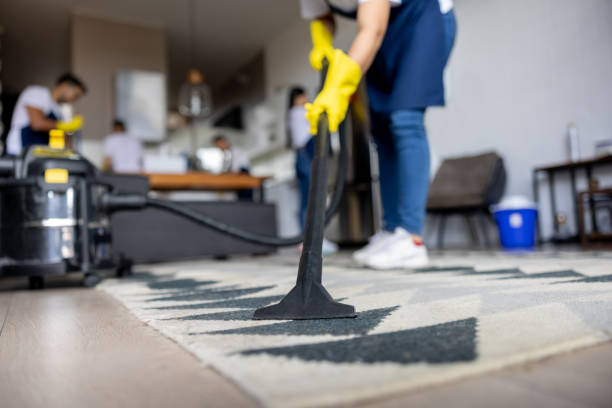There are two main categories that are the best when it comes to cleanliness and hygiene: residential cleaning and commercial cleaning. Although they both entail cleaning up filth, dust, and grime, their methods, sizes, and goals are very different from one another. To ensure that places are immaculately kept, it is imperative that both households and businesses are aware of these differences. We explore the simplicity and significance of the differences between residential and business cleaning in this detail.

What is Commercial Cleaning?
The term “commercial cleaning” describes expert cleaning services designed specifically for establishments, institutions, enterprises, and commercial properties. These establishments encompass a wide array of spaces, including offices, retail stores, restaurants, healthcare facilities, schools, and more. The primary goal of commercial cleaning is to uphold cleanliness standards, create a hygienic environment, and enhance the overall aesthetics of the premises to foster a positive impression on clients, customers, and employees.
Key Aspects of Commercial Cleaning
Scope and Scale
Commercial cleaning typically involves larger spaces compared to residential cleaning. From expansive office floors to sprawling retail complexes, the scope can vary significantly.
The scale of commercial cleaning often demands specialized equipment, such as industrial-grade vacuum cleaners, floor scrubbers, and pressure washers, to efficiently tackle extensive areas.
Frequency and Timing
Unlike residential cleaning, which may occur on a weekly or bi-weekly basis, commercial cleaning follows a structured schedule tailored to the specific needs of the business. This could range from daily cleaning for high-traffic areas to periodic deep cleaning sessions.
Timing is often critical in commercial cleaning, with many businesses opting for after-hours or weekend cleaning to minimize disruptions to operations
Compliance and Regulations
Commercial cleaning services must adhere to industry regulations and standards, particularly in sectors such as healthcare and food service, where cleanliness is paramount for health and safety.
Compliance with health codes, OSHA regulations, and environmental guidelines are integral to commercial cleaning practices.
Specialized Services
Businesses that provide commercial cleaning services frequently provide customized solutions for various settings and sectors. This may include medical facility sanitation, carpet and upholstery cleaning, floor maintenance, and janitorial services.
What is Residential Cleaning?
Residential cleaning pertains to the cleaning of private homes, apartments, condominiums, and other residential properties. Unlike commercial cleaning, which focuses on business-oriented spaces, residential cleaning caters to the unique needs and preferences of homeowners and tenants. The primary objective is to maintain a clean, comfortable living environment conducive to relaxation and well-being.
Key Aspects of Residential Cleaning
Personalization and Customization
Residential cleaning services are highly customizable, allowing homeowners to specify their cleaning preferences, frequency, and areas of focus.
Cleaning schedules for residential properties often revolve around the occupants’ routines and lifestyles, offering flexibility and convenience.
Attention to Detail
Residential cleaning places a strong emphasis on attention to detail, with cleaners meticulously addressing each room and surface to ensure thorough cleanliness.
From dusting delicate décor to sanitizing high-touch areas, residential cleaners prioritize the finer points of cleaning to enhance the overall livability of the space.
Trust and Privacy
Trust is paramount in residential cleaning, as cleaners often have access to personal belongings and private spaces. Reputable residential cleaning companies prioritize security, confidentiality, and professionalism in their services.
Maintaining privacy and discretion is essential in residential cleaning, respecting the sanctity of the home environment and the privacy of its occupants.
Household-specific Challenges
Residential cleaning may involve tackling unique challenges specific to households, such as pet dander, children’s toys, and personalized clutter. Cleaners must adapt their approach to accommodate these factors while delivering optimal results.
Conclusion
In essence, while commercial cleaning and residential cleaning share the common goal of maintaining cleanliness and hygiene, their differences lie in scale, scope, objectives, and approach. Whether it’s ensuring a professional workspace that impresses clients or creating a clean and cozy home environment, both forms of cleaning play integral roles in promoting health, safety, and well-being. By understanding these distinctions, businesses and homeowners can make informed decisions when selecting cleaning services tailored to their unique needs and preferences. Remember, whether it’s Commercial Cleaning for your business or Residential Cleaning for your home, a clean space fosters productivity, comfort, and peace of mind.
FAQ
What is the primary difference between commercial cleaning and residential cleaning?
Commercial cleaning focuses on larger, business-oriented spaces like offices, retail stores, and industrial facilities, while residential cleaning targets homes, apartments, and condos.
What types of cleaning products and equipment are used in commercial versus residential cleaning?
Commercial cleaning utilizes industrial-grade products and equipment suited for larger areas, while residential cleaning uses household cleaning supplies tailored to individual preferences and home sizes.
